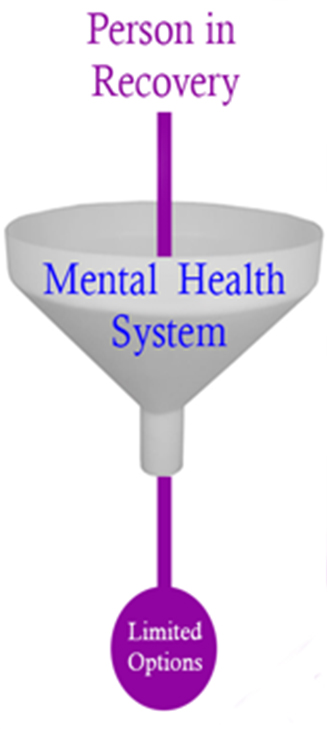
In the various conversations around the role of peer support specialists in Connecticut, one common comment that always seems to come up is how many certified peers are hired and help with the casework of different organizations rather than performing traditional peer support.
What is the basic definition of a caseworker? A caseworker is an employee of a government agency, nonprofit organization, or other groups who takes on the cases of individuals and provides them with advocacy, information, and solutions.
Most of the trained peer support specialists are advocates and have received additional training in advocacy. The peer supporter generally provides information on the services and programs that might be beneficial to the people they are working with at any given time. Supplying support, advocacy, and information opens the path to finding solutions and guiding those who need help to overcome obstacles.
So here is a question, if trained peers can take on a task that can help so many people in recovery, why not expand our role to include the use of that skillset? Looking at the number of certification class offerings in our state each year, you will quickly see we produce more new trained peers for the workforce than we have available job opportunities.
Our goal is not to redefine the definition of peer support. We want to increase its scope and include the work most peers are doing already. This is where Project R.O.S.E. comes into the picture. Rather than creating something entirely new we opted to look at the current skillset most peer level supports use when helping others. Trained peers tend to act from a place of compassion, understanding, and instinct. They often do more than their job description dictates and as a result offer anyone they are working with a true sense of hope. We have identified 4 steps that can be clearly defined and can now follow to do so much more in the evolution of a persons recovery path.

When a person seeks help after a crisis, relapse, traumatic event, or to overcome addiction, that is when recovery begins. It is not anyone’s place to force recovery models on someone else. Every peer knows proper recovery can not begin until that person is ready to do the work. It must be their choice because, in the end, no one will work harder towards their well-being than they will themselves. Certified peers already fill a role in assisting in navigating the recovery system. They offer support, encouragement, and a living example that recovery is possible. This is the work we have always done and will continue doing in the future.

Opportunity: This is where the “caseworker” aspect comes into play. Have you ever dialed 211 or waited a long time to get the help you need? Most people have become very discouraged by the process and the results it tends to produce. The current network of peers working in Connecticut is part of a network of hundreds of people who dedicate their time to supporting and advocating for others.
Over the last two years, Ripple has filled RockingRecovery.org with hundreds of resources because common sense suggests that a person needs things to survive. Housing, access to transportation, employment, food, clothing, etc. There are many different options depending on where you live in the state. We need to be the ones to connect peers who are struggling to these offerings and services. We should be the ones helping them navigate this system of services along with the mental health and addiction services system.
Why? Because getting a foundation underneath them and taking some of the stress out of their lives will only serve to benefit their recovery.

Once a person has been in recovery for a while and has made progress towards their goals, they need a feeling of security. Life happens, and we will always need some level of support from time to time. We have looked at the peer support specialist as a guide up until this point. We have listened to the needs of the person we are working with, and they are now starting not just to survive but also to thrive. This can be a challenging point because fear can creep into their thoughts. What if I lose my job? What if I relapse? What if…
This is the point where the peer supporter is no longer a guide. You have helped them this far, but now it is time for a change. The new phase you enter is where the relationship you have built together becomes a partnership. You begin planning for the what-if scenarios and how to implement those plans if needed. Think of it as kin to a wellness action recovery plan, but the sustainability plan prepares them for what life might throw in their direction. The main goal of the sustainability phase of the program should be to reinforce the foundation you have built together while creating a sense of security and confidence.

Once a person feels stable enough to explore more of the peer community, we encourage them to become more involved. Perhaps by now, they are thinking about helping others and have become interested in the work done by certified peer supporters. Perhaps they want to advocate and want to take classes so they may better express their needs and the needs of others. If you are currently certified as a Recovery Support Specialist or a Recovery Coach, you know what we are talking about, that pull to become part of something meaningful. Empowerment feels like you are no longer on the outside looking in, feeling like you are ready to take that seat at the table. When a person reaches that point, it is our job to offer them a chair.
At the end of the day, it does not matter what career path a person takes, whether they work in the peer recovery community or not. True empowerment comes from knowing how far you have come and that you are ready to face what tomorrow may bring. Empowerment is knowing when you are able to help others and when you need to take a step back for your own well-being. Above all else, empowerment is knowing you are part of something larger, a movement, a community, an idea. It is knowing that no matter where you choose to go from here, you are not alone.

A peer network uses the same funnel but we turn it upside down. You come into it not knowing all your options, or possible paths to recovery. If a peer is working with you they want to see you succeed and will share anything and everything this community has to offer.
Professional providers, even those who call themselves non profits, are selling you a service. It is extremely rare that a mental health network of any kind will recommend a supportive program or service that may redirect you away from their billing department.
Think of this like a funnel, in a mental health care system using traditional treatment methods they work with you (hopefully) to create your treatment plan and then narrow the focus to the course of action they believe will benefit you.

The bottom line is, a peer community of support can give you access and connection to things you won’t find anywhere else. We believe the more options are given to you on your recovery journey, the more likely it will be a success.


